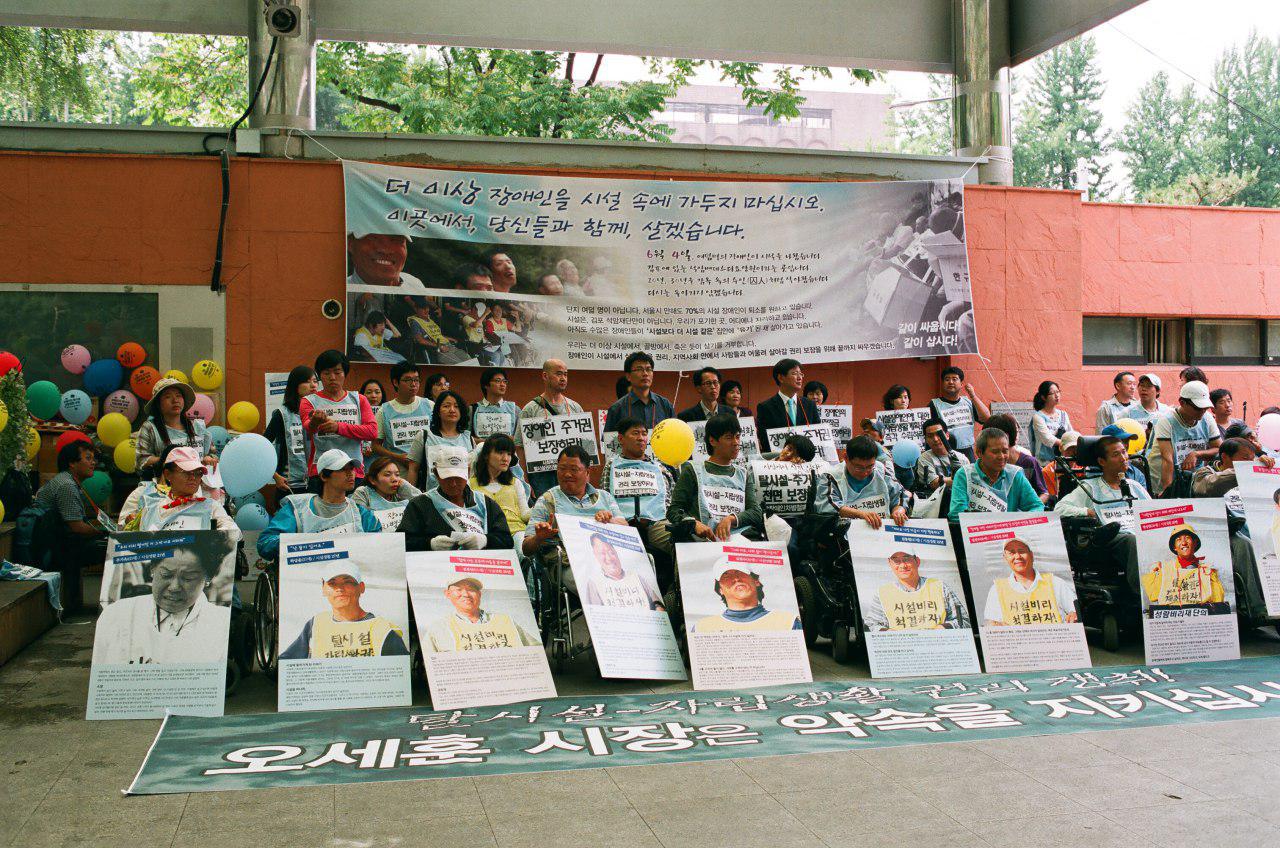On 12 May 13:00(KST), Asia-Pacific regional online consultation for deinstitutionalisation took place by UN CRPD Committee's working group for DI. KDF also participated in the consultation and shared the experiences of the Korean disability community from the past decades of DI activities. KDF prepared this statement with FootAct, a Korean organisation committing to deinstitutionalization. Here are our suggestions for DI guideline by the UN CRPD commiittee.

In 2009, eight disabled people who rushed out of a corrupted institution began a sit-in protest to guarantee the "right" to deinstitutionalise. ©FootAct
1. DI should be implemented promptly
In Korea, the issue of institutions began to be raised in 2005. At that time, there were more than 1,000 undocumented institutions in Korea, and the Ministry of Welfare and DPOs investigated 235 of them. In the institutions, as you can imagine, people had no autonomy and quarantine and binding were common.
Since the investigation, deinstitutionalisation has begun by bringing the individuals who have personally contacted the activists out of the institutions. A Korean activist said, "Most of the people said that 'deinstitutionalisation should be implemented after preparing enough community-based support system', but how much is enough? I know how harsh the word 'wait' was for the people in the institutions."
2. ‘Improving Institutions’ cannot be considered as DI process
Newly deinstitutionalised people exposed the corruption of institutions. Naturally, a struggle to eradicate corruption in institutions began. It called for greater transparency, democratization and openness of institutions. At that time, the disability community expected that this demand would lead to the right to the deinstitutionalisation of disabled people, but it did not and decided to fight for the right to deinstitutionalisation.
3. Demand of the deinstitutionalised people should be heard first
In 2009, eight disabled people who rushed out of a corrupted institution began a sit-in protest to guarantee the "right" to deinstitutionalise. As a result, Seoul metropolitan city established the five-year plan for deinstitutionalisation, and 15 houses were set up for deinstitutionalised people.
4. Emergency support should not be provided in form of institution
Dorandoran Institution was established as a temporary shelter for the disabled victims of slavery-like labour. However, later on, the institution refused to support the deinstitutionalisation of the residents, saying “they are still vulnerable to live outside of the institution.” After a strong fight by the residents and staff against the institution corporation, all residents finally deinstitutionalised in late March.
New attempts are underway to end the history of institutionalisation in Korea. In December 2020, the “Deinstitutionalisation Act” was proposed with the endorsement of 69 Members of the Korean Parliament. The bill states that deinstitutionalisation is the 'right' of disabled people and aims to close all institutions within 10 years. For your information, there are 1,527 institutions in Korea; all of the institutions are funded by the government. In addition, the bill stipulates the obligation of the local and central governments to prepare a system to support housing, personal assistance, income, and other necessary services in the early stages of transition.
We already know what we need for deinstitutionalisation. What is important is the governments’ recognition that deinstitutionalisation is their obligation and right of EVERY person with disabilities. With this recognition, in the process of developing and implementing deinstitutionalisation, states parties should listen first to the voices of disabled people, not of the power-holding institutions. Criterion assessing whether the DI process complies with CRPD Articles 3, 19, 33, and General Comments 5.
